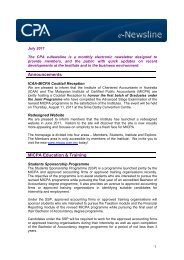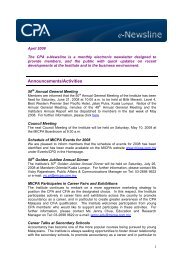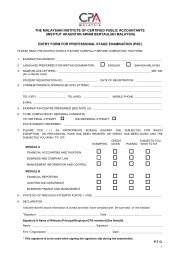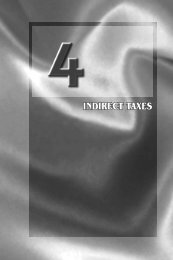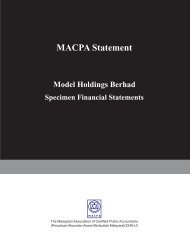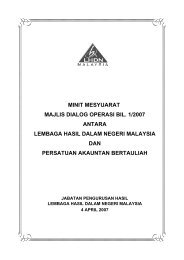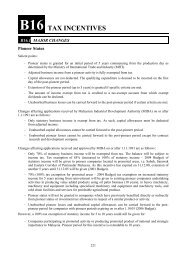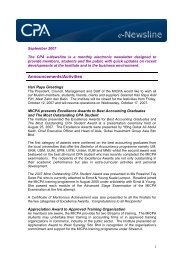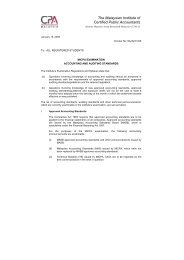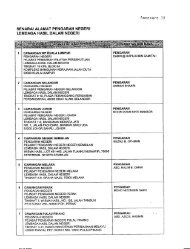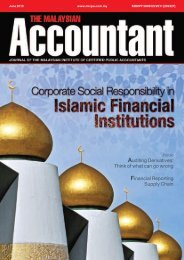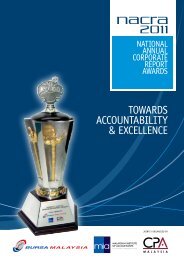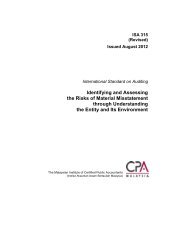The Malaysian Accountant - The Malaysian Institute Of Certified ...
The Malaysian Accountant - The Malaysian Institute Of Certified ...
The Malaysian Accountant - The Malaysian Institute Of Certified ...
You also want an ePaper? Increase the reach of your titles
YUMPU automatically turns print PDFs into web optimized ePapers that Google loves.
consistent in all material respect with IASs. For locallydeveloped standards, the principles underlying the recognition,measurement and disclosure requirements of those standardsare consistent, with other relevant standards issued by theInternational Accounting Standards Committee (IASC).IASC was reconstituted on April 1, 2001 with the birthof the International Accounting Standards Board (IASB),which took over the standard-setting responsibilities. <strong>The</strong>IASB has since committed to developing, in the publicinterest, a single set of high quality, understandable andenforceable global accounting standards that requiretransparent and comparable information in general purposefinancial statements. In addition, the IASB co-operates withnational accounting standard-setters to achieve convergencein accounting standards around the world.To move closer to world convergence of accountingstandards, the MASB recognises the need to converge withInternational Financial Reporting Standards (IFRSs). As afirst step, it has renamed MASB Standards to FRSs with effectJanuary 1, 2005. In addition to the name change, MASB alsore-numbered the Standards to correspond to those of the IASs.Purpose of revising the 10 FRSsPrior to 2005, the MASB made improvements to a number ofinternational standards by adding explanation, guidanceand examples or by amending certain provisions to suit localcircumstances. <strong>The</strong> MASB considered this to be necessary tobroaden the content of the Standards to cover domestic,regulatory or other issues as well as to provide guidance forthe local constituents on topics not addressed in the IASs.In line with the policy of convergence with IFRSs andbased on experience in implementing FRSs equivalent to IFRSs,the MASB has decided to align its accounting standardsissued prior to 2005 (FRSs with a subscript ‘2004’) with therespective IASs, both in terms of form and contents. In orderto achieve this objective, the MASB removed all the remainingdifferences between FRSs and IASs to eventually result inFRSs being virtually identical to IASs / IFRSs.<strong>The</strong> subscript ‘2004’ has been removed from the 10revised Standards.approved accounting standard;3. assist auditors in forming an opinion as to whetherfinancial statements conform with MASB approvedaccounting standards;4. assist users of financial statements in interpreting theinformation contained in financial statements prepared inconformity with MASB approved accounting standards; and5. provide those who are interested in the work of MASBwith information about its approach to the formulationof MASB approved accounting standards.<strong>The</strong> Framework is not an MASB approved accountingstandard and hence does not define standards for any particularmeasurement or disclosure issue. Nothing in the Frameworkoverrides any specific MASB approved accounting standard.<strong>The</strong> Framework is concerned with general purpose financialstatements including consolidated financial statements. Suchfinancial statements are prepared and presented at leastannually and are directed toward the common informationneeds of a wide range of users. Some of these users may require,and have the power to obtain, information in addition to thatcontained in the financial statements. Many users, however,have to rely on the financial statements as their major sourceof financial information and such financial statementsshould, therefore, be prepared and presented with theirneeds in view. Special purpose financial reports, for example,prospectuses and computations prepared for taxationpurposes are outside the scope of the Framework. Nevertheless,the Framework may be applied in the preparation of suchspecial purpose reports where their requirements permit.<strong>The</strong> Framework applies to the financial statements of allcommercial, industrial and business reporting entities asspecified in the Financial Reporting Act 1997. A reportingentity is an entity for which there are users who rely on thefinancial statements as their major source of financialinformation about the entity.For enquiries, please contact: Dr Nordin Mohd Zain,Executive Director, <strong>Malaysian</strong> Accounting StandardsBoard, Suites 5.01-5.03, 5th Floor, No. 338, Jalan TuankuAbdul Rahman, 50100 Kuala Lumpur. Tel: 03-2715 9199,Fax: 03-2715 9212, Email: nordin@masb.org.my(Source: MASB Press Release/ June 15, 2007)Framework for the Preparation andPresentation of Financial Statements<strong>The</strong> Framework sets out the concepts that underlie thepreparation and presentation of financial statements forexternal users. <strong>The</strong> purpose of the Framework is to:1. assist the MASB in the development of future MASBapproved accounting standards and in its review ofexisting MASB approved accounting standards;2. assist preparers of financial statements in applyingMASB approved accounting standards and in dealingwith topics that have yet to form the subject of an MASB2 new proposed Standards for greatertransparency<strong>The</strong> MASB on July 2, 2007 released ED 56 Financial Instruments:Disclosures (ED 56) and ED 57 Operating Segments (ED 57)seeking greater transparency in ways companies managetheir resources as well as their exposure to risks arisingfrom their involvement in financial instruments.ED 56 and ED 57 are virtually identical with IFRS 7Financial Instruments: Disclosures (IFRS 7) and IFRS 8Operating Segments (IFRS 8) respectively.IFRS 7 and IFRS 8 were issued by the International44 | <strong>The</strong> <strong>Malaysian</strong> <strong>Accountant</strong> | June/August 2007 www.micpa.com.my



